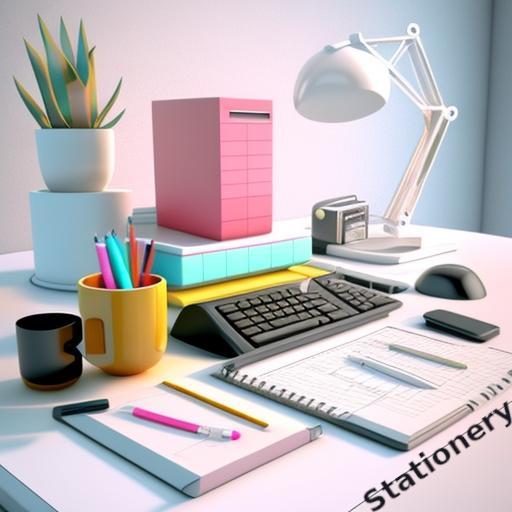








The office environment is a space where productivity, creativity, and organization converge. To create an optimal workspace, having the right office equipment and stationery is essential. This comprehensive guide aims to provide valuable tips for navigating the realm of office equipment and stationery, helping you optimize efficiency, foster creativity, and maintain a well-organized workspace.
Assess Your Needs:
Before diving into the world of office supplies, assess your specific needs. Consider the nature of your work, the tasks you perform regularly, and the tools that would enhance your efficiency. This will guide your purchases and prevent unnecessary clutter.
Invest in Ergonomic Furniture:
Your office chair and desk are critical components of your workspace. Invest in ergonomic furniture that promotes good posture, reduces discomfort, and supports your overall well-being. A comfortable and well-designed chair can significantly impact your productivity.
Quality Desk Accessories:
Organizational tools like desk organizers, trays, and file holders are essential for maintaining a clutter-free workspace. Invest in high-quality desk accessories to keep your pens, papers, and other supplies neatly arranged, enhancing both functionality and aesthetics.
Choose the Right Writing Tools:
Select writing tools that suit your preferences and tasks. Whether you prefer classic ballpoint pens, gel pens, or the timeless feel of a fountain pen, having the right writing instrument enhances the writing experience and contributes to a polished presentation.
Optimize Lighting:
Proper lighting is crucial for reducing eye strain and creating a comfortable work environment. Invest in adjustable desk lamps that provide adequate illumination without causing glare on your computer screen. Natural light is also beneficial, so position your workspace near windows whenever possible.
Upgrade Your Technology:
Stay current with office technology to maximize efficiency. Upgrading your computer, printer, and other essential devices ensures that you can keep up with the demands of modern work. Regularly update software to take advantage of the latest features and security enhancements.
Stock Up on Stationery Basics:
Maintain a well-stocked inventory of stationery basics, including pens, notepads, sticky notes, and paper clips. Having these essentials readily available prevents interruptions to your workflow and ensures that you can jot down ideas or important notes at any time.
Personalize Your Workspace:
Add a personal touch to your workspace with tasteful decor, plants, or inspirational quotes. A personalized environment contributes to a positive and motivating atmosphere, boosting creativity and overall job satisfaction.
Organize Cables and Wires:
Cable management is often overlooked but is crucial for maintaining a tidy workspace. Use cable organizers or clips to keep cords and wires neatly arranged, preventing tangling and making it easier to access and identify each cable.
Labeling and Filing Systems:
Establish a labeling and filing system to keep documents organized and easily accessible. Invest in quality file folders, labels, and storage solutions to create a systematic approach to document management.
Regular Maintenance:
Perform regular maintenance on your office equipment to ensure longevity and optimal performance. Clean computer keyboards, dust off electronic devices, and replace worn-out components promptly. Regular maintenance prevents unexpected malfunctions and prolongs the life of your equipment.
Budget Wisely:
While it's tempting to indulge in the latest office gadgets and accessories, budgeting wisely is essential. Prioritize essential items first, and allocate funds for upgrades or additional accessories based on your needs and available resources.
Office equipment and stationery are essential for businesses and individuals to operate efficiently. The categories in this sector include:
Writing instruments: This category includes pens, pencils, markers, and highlighters. These are essential for writing and taking notes.
Paper products: This category includes paper of various sizes, colors, and weights, including printer paper, notebooks, sticky notes, and post-it notes.
Desk accessories: This category includes items such as desk organizers, staplers, hole punches, tape dispensers, and paper clips.
Filing and storage: This category includes file folders, binders, report covers, and storage boxes. These items are essential for organizing and storing paperwork.
Presentation and display: This category includes whiteboards, projectors, and display boards. These items are essential for presenting information in a meeting or classroom setting.
Office machines: This category includes printers, copiers, scanners, and fax machines. These machines are essential for creating and sharing documents.
Computer accessories: This category includes items such as keyboards, mice, and monitor stands. These accessories can help to improve ergonomics and productivity in the workplace.
Office furniture: This category includes desks, chairs, and other furniture items. These items are essential for creating a comfortable and functional workspace.
Office equipment and stationery have seen several innovations in recent years, including:
Digital pens and smart notebooks: These devices allow users to write notes on paper and have them automatically digitized and stored in the cloud. This helps to eliminate the need for physical paper storage and improves accessibility to notes.
3D printing: 3D printing is being used to create customized office equipment and stationery items, such as personalized paperclips and unique pen holders.
Digital whiteboards: Digital whiteboards can sync with other devices and allow multiple users to collaborate on a single document in real time. This makes it easier to collaborate remotely and reduces the need for physical whiteboards and markers.
Ergonomic office furniture: Ergonomic office furniture is designed to reduce strain and improve posture, such as standing desks and adjustable chairs. These items can help to reduce workplace injuries and improve productivity.
Smart office machines: Smart office machines, such as printers and copiers, can connect to the internet and integrate with other software programs, allowing for more efficient and streamlined workflows.
Digital filing systems: Digital filing systems eliminate the need for physical paper storage and allow for easy organization and accessibility of digital documents.
Office equipment and stationery are often connected with bookstores because they are all products that are commonly used in an office or educational setting. Bookstores typically offer a wide range of books, including textbooks, which are often used in classrooms and offices. Additionally, bookstores often carry a variety of stationery items, such as pens, notebooks, and binders, that are commonly used in an office or educational setting. This makes bookstores a convenient one-stop-shop for individuals and businesses to purchase all of their office and educational needs. Furthermore, bookstores often offer a range of other products such as greeting cards, gift items, and journals, which can also be used in an office or educational setting. Therefore, the combination of books, stationery, and other related items makes bookstores a natural fit for those looking to purchase office equipment and stationery items.
The bookstore sector has seen several innovations in recent years, including:
Online shopping: Bookstores have expanded their online presence, offering customers the ability to browse and purchase books and other products online, and have them delivered directly to their doorstep.
E-books and audiobooks: Bookstores have started offering electronic books and audiobooks as a way to expand their product offerings and provide customers with more options for reading.
Print on demand: Bookstores are using print-on-demand technology to offer customers the ability to order books that are not currently in stock, and have them printed and bound on-site.
Personalization: Bookstores are offering customers the ability to personalize books with custom covers, dedications, and other features.
Pop-up stores: Bookstores are using pop-up stores to reach new audiences and offer a unique shopping experience. Pop-up stores can be used to showcase new products, host author events, or offer limited-edition products.
Sustainable materials: Bookstores are increasingly using sustainable materials for products such as bookmarks, journals, and tote bags. This helps to reduce the environmental impact of the industry.
Virtual events: Bookstores are using virtual events to connect with customers, offer author talks, and host book clubs online.
Creating an efficient and inspiring workspace involves a thoughtful combination of office equipment and stationery. By incorporating these tips into your office setup, you'll not only enhance productivity but also create a space that reflects your professionalism and personality. Embrace the potential for creativity and organization within your workspace, and let your office equipment and stationery contribute to your success.
Have a good one,

We use cookies
We use cookies and other tracking technologies to improve your browsing experience on our website, to show you personalized content and targeted ads, to analyze our website traffic, and to understand where our visitors are coming from. Privacy Policy.
